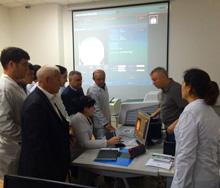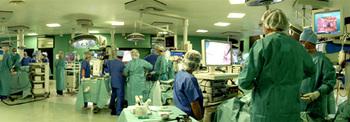Context
A dramatic rise in the prevalence and incidence of cardiovascular diseases, cancer and diabetes in recent years has led to several major healthcare reforms in Uzbekistan as part of the country’s drive to improve health service efficiency. Following independence, the Uzbek Government immediately invested several hundred million US dollars in better quality healthcare. Its aim: to give the Uzbek people access to state-of-the-art healthcare technology. Although this high-tech medical equipment is now available, a shortage of skilled health workers is compromising service quality and delivery. To address this issue, GIZ and the Ministry of Health (MoH) of the Republic of Uzbekistan initiated the project ‘Advanced training for medical and technical professionals working with high-tech medical equipment’.
Objective
The Uzbek population in selected regions has better access to modern diagnostic and therapeutic techniques in the public healthcare system.
Approach
The project is helping to train medical and technical personnel in various medical fields in a bid to:
- Build the capacity of medical and technical professionals to use advanced, state-of-the-art healthcare technology and to conduct preventive technical maintenance work.
- Assure the quality of clinical applications and improve health technology management.
- Improve the management of diagnostic methods – imaging technologies (MRI, CT, Doppler sonographer and digital x-ray) – and treatment strategies such as minimally invasive surgery (laparoscopy, hysteroscopy and endoscopy etc.) in selected clinical procedures.
- Organise close financial cooperation between the German Government (German Development Bank, KfW) and selected tertiary referral hospitals, the medical device industry and academia.
Results
Since its launch in August 2013, the project has organised numerous basic and advanced training courses, both in Uzbekistan and elsewhere. The project has commissioned four training centres for surgeons and radiologists specialising in minimally invasive interventions at referral hospitals in Tashkent and Andijan. These advanced training centres now constitute integral components of the continuous education services provided by the Tashkent Institute of Post-graduate Medical Education and the Andijan State Medical Institute. Close collaboration with high-profile university hospitals in Germany, Russia and France has led to the sharing of international experience and standards and provided access to guidelines, information materials and research.
Another main objective of this project is to assist the Ministry of Health of the Republic of Uzbekistan to develop a national training strategy for medical and technical personnel employed in the public health system. A component of this strategy involves teaching professionals to use modern medical technology. So far, the project has promoted the establishment of two training centres in Tashkent – one where technical specialists can train (Training and Production Centre) and one for learning how to handle medical devices (MedInTech). Both centres are fully equipped with modern medical devices, office equipment and furniture. Responsible for providing post-graduate and continuing training, these centres issue participants with state-approved certification.
The project has started to install an open source medical device information system – openMedis – at the training centres and is planning to scale-up the use of this software.
In the period from 2013 – 2017, a total of more than 700 endoscopic surgeons, 240 radiologists, 95 medical technicians and more than 100 theatre nurses were coached by local trainers and international experts introduced by the project.
2016 saw the rollout of a new pilot site, namely the Samarqand Perinatal Centre. Work here aims to assess the use of on-site oxygen generation, with a view to extending this option to other facilities.

